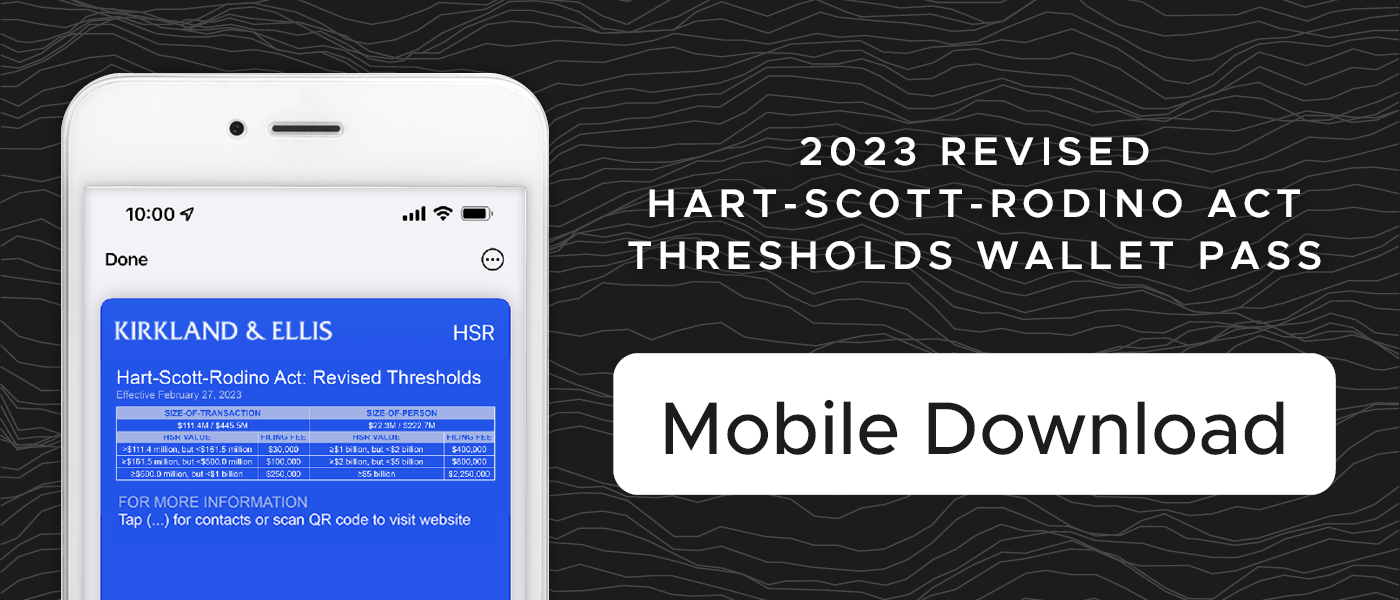Revised Hart-Scott-Rodino Act Thresholds, Filing Fees and Civil Penalty Amounts Announced
The Federal Trade Commission (“FTC”) recently published several final rulemakings including: (1) its annual revisions to the Hart-Scott-Rodino (“HSR”) Act filing thresholds; (2) a new HSR filing fee structure that decreases filing fees for some transactions while significantly raising filing fees for other transactions; and (3) increasing the maximum civil penalty amounts for violations of the HSR Act. Further — as described below, new rules are expected soon regarding reporting of foreign subsidies as part of an HSR filing.
Updated HSR Thresholds
The HSR Act requires annual adjustment of the thresholds based on the change in the U.S. gross national product. The new HSR Act filing thresholds are effective for transactions closing on or after February 27, 2023 (the “effective date”). The new filing fees will impact any filings made on or after the effective date. Filings made prior to the effective date are not impacted by the changes to either set of thresholds. All thresholds will increase from the prior year.
Under the new thresholds, and subject to certain exemptions, HSR forms must be filed when, as a result of an acquisition, the buyer will hold assets, voting securities, and/or non-corporate interests valued in excess of $111.4 million and the transaction involves parties with annual net sales or total assets valued at $22.3 million or more and $222.7 million or more, respectively. If the value of the assets, voting securities and/or non-corporate interests to be held after the acquisition will exceed $445.5 million, then — again, subject to certain exemptions — HSR filings must be submitted regardless of the size of the parties.
The chart below summarizes last year’s thresholds and the new thresholds.
| Original Thresholds | 2022 Thresholds | New 2023 Thresholds | |
| Size-of-Transaction |
$50 million $200 million |
$101.0 million |
$111.4 million $445.5 million |
| Size-of-Person (for transactions valued below $200 million (as adjusted)) | $10 million $100 million |
$20.2 million |
$22.3 million $222.7 million |
Please note that there is no change in dollar values with respect to either (1) the exemption for acquisitions of certain reserves of oil, natural gas, shale or tar sands, or rights to reserves of oil, natural gas, shale or tar sands and associated exploration or production assets valued at less than $500 million, or (2) the exemption for acquisitions of certain reserves of coal, or rights to reserves of coal and associated exploration or production assets valued at less than $200 million.
New Filing Fee Tiers
The FTC has implemented a new HSR filing fee structure that establishes six filing fee tiers to replace the three tiers currently in place. For some transactions, filing fees will decrease, while for other transactions, the filing fees will significantly increase.
For filings made on or after February 27, 2023, the following new filing fees will apply:
| Transaction Value | Filing Fee |
| Greater than $111.4 million but less than $161.5 million | $30,000 |
| Greater than or equal to $161.5 million but less than $500.0 million | $100,000 |
| Greater than or equal to $500.0 million but less than $1.0 billion | $250,000 |
| Greater than or equal to $1.0 billion but less than $2.0 billion | $400,000 |
| Greater than or equal to $2.0 billion but less than $5.0 billion | $800,000 |
| $5.0 billion or more | $2,250,000 |
After fiscal year 2023 ends, both the fee tiers and the filing fees will be adjusted annually based on changes to the consumer price index. Any adjustments to the filing fees will be rounded to the nearest $5,000.
Increased Maximum Civil Penalty
The FTC also has announced an increase in the maximum civil penalty amounts for HSR violations from $46,517 per day to $50,120 per day, effective January 11, 2023. The FTC is required by law to adjust the HSR penalty amounts and various other civil penalty amounts annually for inflation pursuant to a cost of living adjustment.
Other Upcoming Changes
As part of the recently passed Merger Filing Fee Modernization Act of 2022, parties submitting HSR filings will soon be required to include information concerning subsidies they receive from countries or entities that are “strategic or economic threats to the United States.” The law is intended to provide the government agencies with information to allow them to better assess to what extent foreign subsidies, grants, loans and the like may distort the competitive process by allowing the subsidized firm to pay above-market pricing, or otherwise undermine competition following an acquisition. In addition to the FTC, the Antitrust Division of the Department of Justice (“DOJ”), the Committee on Foreign Investment in the United States (“CFIUS”) and the heads of other appropriate agencies will work together on this effort.
We expect rules to be implemented that will expand the scope of information required in HSR submissions; however, the timing of these rules, as well as what information will be required and in what format, remains an open question.






